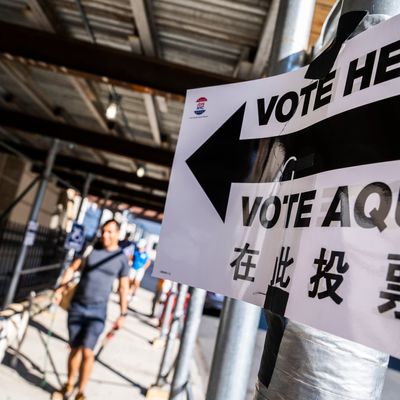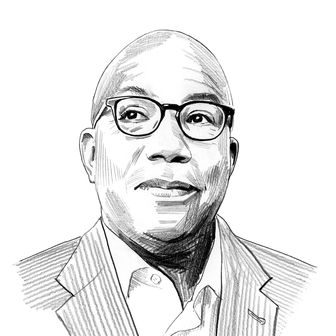
You don’t have to wait for the November election to join the battle for American democracy. Important parts of the fight are taking place every day in the myriad informal spaces where people discuss what matters to them: houses of worship, taverns, lecture halls, coffee shops, family gatherings, and yes, online social media.
The need is urgent. A Quinnipiac poll taken in late August found that 75 percent of American adults are dissatisfied with how things are going in the country. An ominous 67 percent — with nearly identical splits among Democrats, Republicans, and independents — agreed with the startling statement that “the nation’s democracy is in danger of collapse.”
Craig Newmark, the founder of Craigslist, thinks we’re going to have to talk our way back to normal.
“Really, what I want to see is a lot more people concerned about the issue and ready to stand up for what helps protect our country,” he told me. “It’s old-fashioned of me to say it, but we’re talking patriotism. It’s incumbent upon people of goodwill to flood the zone with facts. I think that’s going to be a very big deal come November, and then November two years from there.”
Newmark is spending $250 million of his personal fortune to fund pro-democracy institutions and initiatives around the country. The latest is a free online forum, the State of America Summit, set for Wednesday, September 21, that will feature talks by well-known names such as attorney-activist Maya Wiley, mayor Eric Garcetti of Los Angeles, and ex-mayor Michael Nutter of Philadelphia, along with tech-oriented civic innovators like Andrew Rasiej, the co-founder of Civic Hall, and Alexis Niemczewski, the CEO of BallotReady. (I have been a part-time adjunct at CUNY’s journalism school, funded by and recently named for Newmark, since 2011.)
Never underestimate the benefits of holding a simple, civil discussion about values, candidates, and issues. The data suggests your neighbors, co-workers, and family members know much less about politics than you probably realize. Economist Bryan Caplan summarizes the bad news in The Myth of the Rational Voter:
About half of Americans do not know that each state has two senators, and three-quarters do not know the length of their terms. About 70 percent can say which party controls the House, and 60 percent which party controls the Senate. Over half cannot name their congressman, and 40 percent cannot name either of their senators.
Those numbers have remained stable over many decades since the dawn of modern opinion polling, notes Caplan. Americans simply don’t know — and don’t think they need to know — very basic information about how our system works. That’s an open invitation to cynical demagogues, foreign adversaries, and conspiracy theorists, who are poisoning the public debate with disinformation and openly threatening to nullify or cancel elections. The road to the January 6 Capitol riot was paved with ignorance.
And far too many people are still on that road. The November midterms will include an estimated 43 election deniers running for governor, attorney general, or secretary of state in 27 states — candidates who parrot, or actually believe, the Big Lie that Donald Trump won the 2020 race and President Biden is not the legitimately elected president. Deniers are running in swing states, including Arizona, Pennsylvania, Michigan, and Wisconsin, which could decide the outcome of the next presidential election in 2024.
On the other side of the ledger, our institutions continue to hold the line, slowly but surely bringing the anti-democratic forces to account.
Congressional hearings on the January 6 insurrection are set to resume later this month, and several active and potential legal cases are proceeding against ex-president Trump. A prosecutor in Georgia is using the state’s anti-racketeering laws to build cases against Trump allies who attempted to pressure election officials into fraudulently declaring him the winner of the state in 2020. The Justice Department is pressing forward its investigation into the trove of classified documents it says were improperly taken from the White House by Trump in violation of federal law.
The ex-president, in a reminder of what’s at stake, recently issued an unsubtle threat about the violence that might ensue if he’s criminally prosecuted for his alleged misdeeds.
“I think you’d have problems in this country the likes of which perhaps we’ve never seen before,” he warned conservative broadcaster Hugh Hewitt. “I don’t think the people of the United States would stand for it.”
As always, the question is not what Trump might do; he already showed the world that on January 6. What matters is what the rest of us intend to do about it.
Newmark says the public needs to keep up a constant dialogue about the values and institutions that hold our society together.
“There are bad actors out there, both foreign and domestic, who want to stop Americans from voting. I was too young to help in the ’60s and, for sure, I’m not as brave as some of the people who went south and risked getting killed, some of whom did get killed. I’m not that brave,” he says. “We want to expose everyone to what’s really going on. That means repeating what’s going on and then repeating it again until people get the idea.”
That applies to all of us. Be sure to vote in November, of course. But also take time to talk with neighbors, friends, family, and coworkers about the issues, the current threats to democracy, and — most important — the basics of registration and voting. It might be both the least and the most you can do to help fight the good fight.






























